Signing on again
Despite winning the Tour de Langkawi last month, South Africa's David George is still searching for...
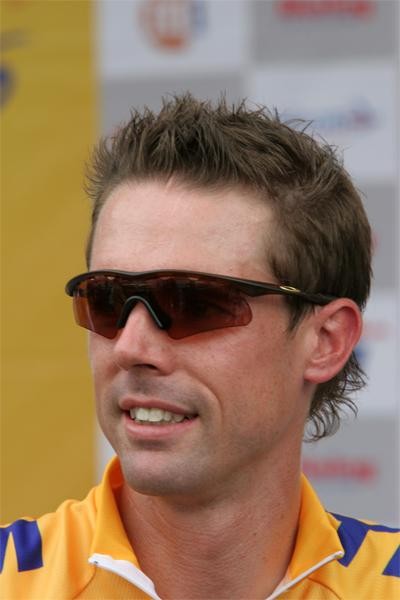
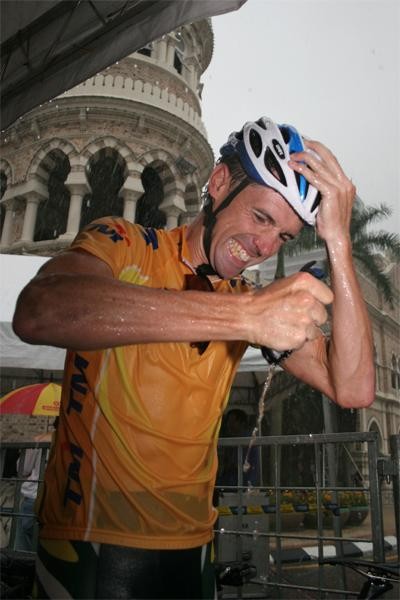
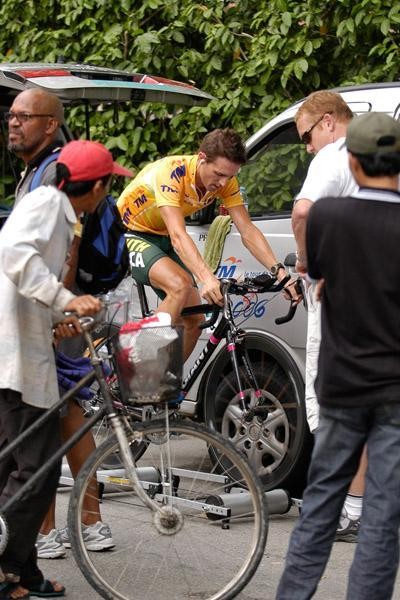
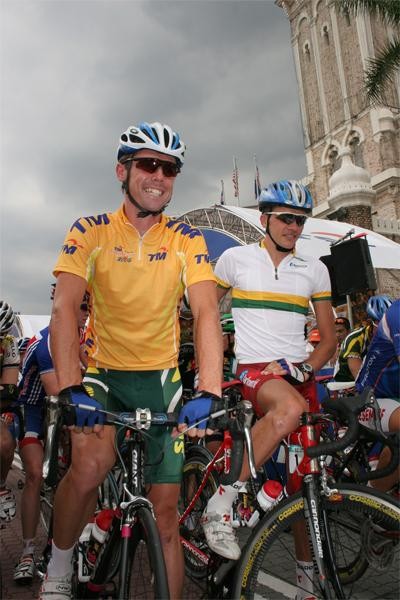
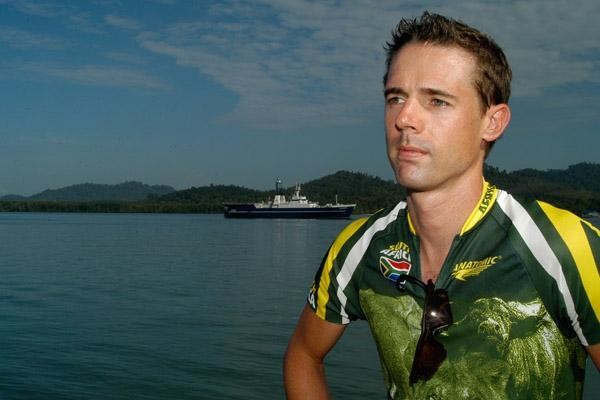
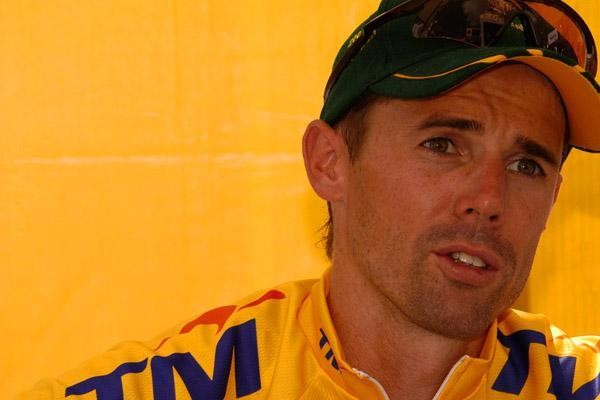
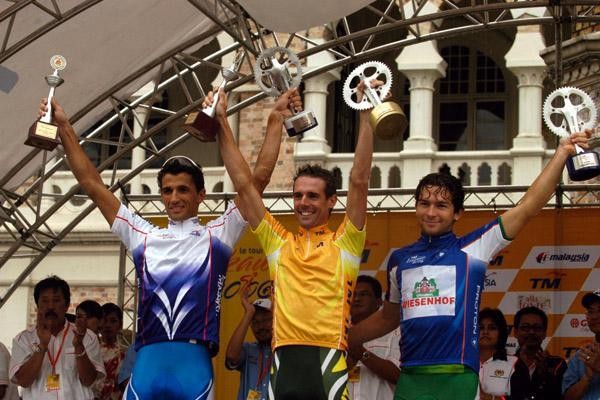
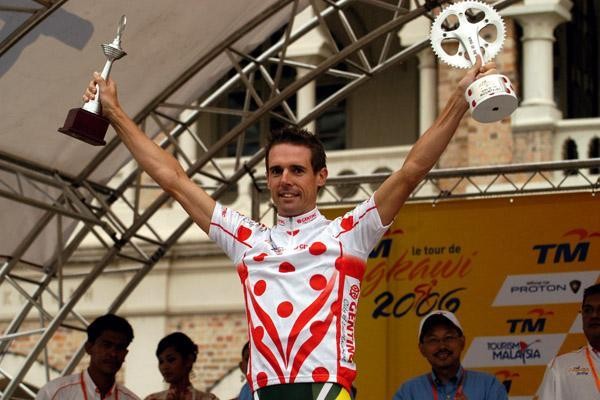
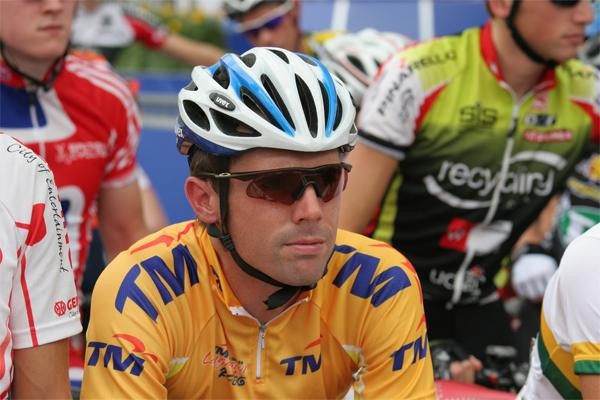
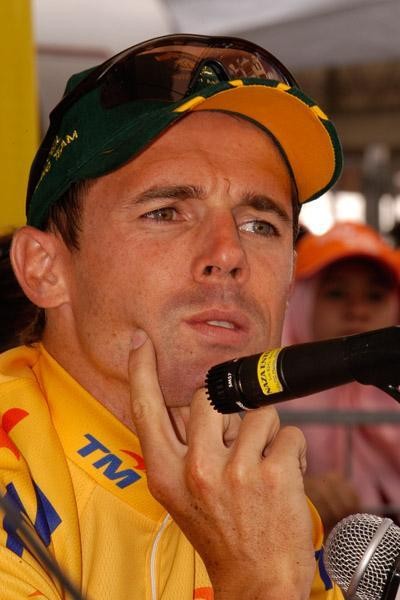
An interview with David George, March 6, 2006
Despite winning the Tour de Langkawi last month, South Africa's David George is still searching for an elusive pro contract. The 30-year-old is hoping a good ride in the Giro del Capo and the Commonwealth Games will help him sign a strong new deal; he tells Cyclingnews' Shane Stokes about the last few months, his chances of securing a pro ride and how he aims to get there.
So far, 2006 has been both a rewarding and frustrating year for David George; having taken his biggest career win in February when he won the Tour de Langkawi, George still finds himself without a professional contract over two months into the season. He rode with Team Barloworld last season and was one of those left without a deal following wholesale team management changes; he's now hoping to secure another ride and continue his career, feeling confident that with some strong results he's moving onto a new level.
George went into the Tour de Langkawi sharing the leadership role with South African team mate Ryan Cox, who had won the event in 2005. Both got into the decisive break on stage one, opening up a lead of over seven minutes and ensuring that just 24 riders were left in the running for the overall victory. Two days later he made his move on the tough mountain stage to Cameron Highlands, driving a breakaway group towards the finish and crossing the line just behind stage winner Saul Raisin. The ride was more than enough to put him into yellow and, backed by what proved to be a very strong team, he successfully defended that lead all the way to the finish in Kuala Lumpur.
"People were saying afterwards 'you came here with a point to prove and you have proved it,' but it wasn't really like that," says George. "It was just an affirmation of what I love doing and want to continue to do. If I was hungry, it's because I don't want to stop. Ok, yes, maybe it was good to ride well after what happened, but I am not out to show somebody something. I just want to carry on doing what I love doing. I also believe that I have got a lot more potential than has been realised so far."
George's ride attracted the notice of several teams, who began talks with him as a result of his performance in Malaysia. He has told Cyclingnews in recent days that he is in negotiations with "one or two teams," and hoped to be back in Europe after the Commonwealth Games. Before then, the Giro del Capo is a callin' - the 2.2 ranked event is the biggest race in South Africa and, as a three-time victor, he knows what it takes to win the event. However, unlike Malaysia, he will be up against former team-mate Cox, defending champion Tiaan Kannemeyer and the rest of the Barloworld team.
For George, recent times have been uncertain but also rewarding. "I think that every challenging experience can help you, in that it's only when you are challenged in life that you really have to show character," he says, somewhat philosophically. "You question yourself and how you have done things, and what you can improve on. It has been tough, but there were times in December of when I was incredibly grateful for having gone through what I have gone through. That's purely from a 'character development' point of view, looking at how other people do things, how not to do things and how to live your life."
The latest race content, interviews, features, reviews and expert buying guides, direct to your inbox!
Providing he can find a deal, he's confident that the best is yet to come. "I have matured a bit and definitely feel stronger for being the latter side of 20," he says. "If I can find a place where I could sit down and discuss a programme and a set of objectives, I know I can do something good. I came close to winning a few big races in Europe last year, so I am ready to win. I am ready to take a leadership role. Maybe not in Grand Tours, but in smaller five-day tours and one-day events. I want to listen, and learn, and improve in all aspects."
Cyclingnews: Well done on your Tour de Langkawi win. Before we talk about that, can you fill us in first on how things went for you last year?
David George: Well, the season was good. I set out to consolidate, to try to have a solid year in Europe. We [South Africans] have always been good in February and March but when we get to Europe, we tend to be a little bit wasted out. I got hit by a taxi at the beginning of the year, a bit of an accident. Myself and Jeremy [Maertens] were out training a few days before the national championships last March and we got hit from behind. We both went down like skittles - I still have a chainring mark on my right leg to show for it.
The crash was nothing too hectic but it just set me back a little bit. I really only got going in April. I went off to Europe and didn't have a bad year there - I was top ten in Aragón, fifth in [Giro del] Trentino, which is a big race. I was seventh at Bicicletta Vasca, another big one. I had two situations which prevented me going better; not bad luck, as such, but two things that needed not to happen for me to win the races.
I had a good period then, and came back in July and went to the Tour of Portugal. It was obviously an objective for the team as we have business interests there. Vladimir Efimkin got the jersey so we worked flat out. We had one rider less than everyone else from the start, so we obviously had to defend that quite hard. My big focus for that next period was the Tour of Britain. Again, I was up there but then I punctured on the mountain stage...it happened with about 10 kilometres to go. The race was all spread out then, so that was that.
CN: How had you been going?
DG: Good. I was just outside the top ten [he was 13th, 18 seconds off the race lead - ed] and poised for a reasonable finish. Generally it was a good year. I had, well...not bad luck as such, but things didn't line up perfectly to get victories. I had a solid year and I feel I did a solid job for the team. Yet then it all fell to pieces.
CN: Did losing your place on the Barloworld team happen due to a change in management, or did it occur before that?
DG: [Pauses]...Well, it's clear that the project was badly managed from the start, and I'm not the type of person who will keep quiet in a situation where things are not working as they should be. I tend to get involved, which sometimes is to my disadvantage. I'm not too sure when the management change happened if it was because I was too involved, or whether Claudio Corti didn't think I was good enough. But basically what happened is that they had five South Africans who had contracts. I'm not sure where the mandate as to whether they didn't want more [South Africans on the team] came from, or they wanted more guys from other countries.
CN: Was your contract due to end last year?
DG: Yes, it was.
CN: So when did you find out that the team wouldn't be renewing it?
DG: It was the end of November. I had the impression that I had something before then, that things would work their way out [in terms of a contract]. Again, I have been in a few different teams but the thing that is closest to my heart is racing with these guys. I think we have a big future together as opposed to a reasonable future racing as individuals.
It's great to be racing together on a South African team, and good for life outside cycling as well. We are good mates and wouldn't be able to do what we did at the Tour of Langkawi if we weren't a close unit. We have our ups and downs, of course, like any relationship. There are times when you are getting on better with one and not with another, but generally we have managed to bond as a unit, which for me is important. That is where I wanted to be. I wasn't going all out to try to get out [of Barloworld]. I was going all out to try to stay in and keep with it as a group.
CN: November is very late to find out that you don't have something for the following season. Had you known earlier that you had to look elsewhere, do you think you could have picked something up?
DG: Yeah. I think I would have pursued it a bit harder, for sure.
You know, this [Barloworld] has been a project that I have had a lot of passion for, from the start. I think that certainly influenced the direction the team went in and the speed it went in that direction. Because we really wanted it. If two or three guys really want it [success], that then filters down to the rest of the guys. When it started, we had a lot of passion and a sponsor who saw it as a South African group of guys going to Europe and racing in Europe. Then we had to get involved with European cycling, because we are inexperienced and we need to learn. But then it almost gets hijacked - they've now turned around and said that it's not a South African team.
CN: Really? Because that was always the goal, to take a South African team to the Tour de France.
DG: Yes. Now there are just five guys left, those who had contracts. Originally the majority of the team were South Africans. I think again that might have played to my detriment because that's the way I saw it happening, it being a primarily South African team - that was the attraction at the start.
Things have changed now. Claudio Corti is now the manager but [in dealing with them] he has to look at youngsters and consider the way we think in South Africa. It's not the same as the way you would think if you were an Italian. Cycling in our country is not for the hardened working class; it's executive, people with parents who can afford to ride bikes. It's changing, but you are not going to get the hardened Russian attitude. You are going to get somebody who has got a little bit of his own personality, who questions a little bit - that's generally not well received [in European cycling]...you can't question.
CN: Presumably the Tour de Langkawi became a more important objective for you because you are now looking for a team.
DG: Well, I was waiting and waiting and waiting, hearing 'yes', 'maybe', and 'we have got to see'. It carried on way into December - one day I was getting a good impression, the next day it was the opposite.
CN: So even at that point you weren't told where you stood?
DG: I actually still haven't had a solid answer, I still haven't had a call saying, 'listen, Dave, we can't do this.' To me, that is a little bit wrong. The whole way through, I was preparing for the season as normal but with enough volume to be able to switch over and say 'right, this is what I've got to do'. When I say that I was sole-minded about Malaysia, I think it was more the hunger rather than the physical aspect of it. Physically I can improve, for sure.
CN: So you don't think you are at a higher level now that in previous years?
DG: No, not at all. Not at all. I have matured a bit and a definitely feel stronger for being the latter side of 20 in terms of experience, knowing my body, knowing my head. So there was nothing holding me back, I knew what I had to do.
CN: The Tour de Langkawi is probably your best career result. What other big rides have you done?
DG: Well, before this I got a medal at the world's as an under 23, and then I signed for US Postal. I was reall green, I was just a kid shoved in at the deep end. Again, I questioned a lot and I didn't really have a mentor to say, 'listen, Dave, do it like this.' So I did two years there and then I went to the Italian Tacconi Sport-Vini Caldirola team. Again, you've changed country, you've changed language and there is a learning curve; so for the first couple of months you're scrambling a bit. But then towards the end of the year I started to go ok - yet ok is never enough. The team loses a sponsor, they can't take too many guys, so you are always left short.
That was it for that year, then I came here to Langkawi and did a reasonable ride. That got me a little bit of interest and I signed for that Polish team CCC Polsat. That was a disaster, the guy wasn't paying. I had one or two good results but it was just frustrating.there was no integrity.
CN: What did you do then?
DG: Well, at that point I was thinking that I can continue on scrambling around, or I can try to really make something work in South Africa. So I went back to South Africa and signed for Barloworld. I was there pretty much from the start - two months into the project initially the sentiment was "let's stay here and win races in South Africa." I am a dreamer so I will always go for the full story. Not that it was all me; I'm not trying to take the credit, but I wanted to race in Europe.
I won the Giro del Capo that year and obviously got the team launched in the right direction. Barloworld were happy because they got their media coverage. We spent the year racing around France, which was a bit, well...disorganised. Then the next year, the team was using a lot of the infrastructure that I had built up over the years. We decided to go to Italy, to base ourselves there, so that was the next step. I had a mediocre season in my second year with Barloworld, though, having back problems. But I did win the Giro del Capo again.
CN: Looking back, would you have changed anything?
DG: I think that we always paid for being good in February and March; ok, I think was important for the sponsor, because if we didn't do that they wouldn't have continued in the sport, they wanted to win in South Africa. But then you get to Europe and it is just an extension of your whole season. The European guys are getting frustrated because you are not good in Europe but firing well in South African races.
The lack of leadership [was also an issue]. No one ever sat down with them and said 'we've got to win these races, so you have got to lay off these guys. We've got to structure things a little bit better so that we can win these and the riders can still be good in Europe.' There was no direction or leadership.
Then last year, through millions of different deals, the team ended up being 25 guys. We had a little bit of this team, a little bit of that team. Again, it was all diluted and there were no chains of command, no leadership. But we did have a great group of guys, and we really clicked as a team and won a lot of races. You don't win races unless you are connecting. Yet then it kind of fell to pieces at the end of the year; it just got too big for the management to handle. I almost feel that it petered out and almost regressed a step or two.
CN: So you have come here and done the business in Malaysia, winning the Tour de Langkawi. What was that experience like?
DG: Well, it was never a case of.people saying to me, 'you came here with a point to prove and you have proved it,' but it wasn't really like that. It was just an affirmation of what I love doing and want to continue to do. If I was hungry, it's because I don't want to stop. Okay, yes, maybe it was good to ride well after what happened, but I am not out to show somebody something. I just want to carry on doing what I love doing. I also believe that I have got a lot more potential than has been realised so far.
Anyway, coming here and winning the Tour de Langkawi is a relief. But I will obviously be happier when I know I have a direction [in terms of a contract].
CN: Coming into the race, how certain were you that you would ride well and be up there in the running for the overall win?
DG: Well, I knew I had worked hard. I did a good block of training and I can generally feel when my body is in good shape. But it's the first race of the year. Coming out of it, I know I am going well, and I can go to the next race and be confident that I am flying. But heading into it, you can think you are going good but until you have actually done the race, you don't know.
CN: Did you expect to get the lead so early?
DG: Well, my vision for the race was stage three. That is when I thought "ok, right, if it's going to happen it will happen here." It's a difficult stage and on Genting, everybody is sort of aware and prepared for it. So if you want to make a little bit of a difference, it might be stage three.
CN: Was the goal to get up the road early on?
DG: It's always the goal to get up the road early on. Stage one was, I suppose, a bit of a surprise, but some things just go according to song. You get into a break and it's not an effort to be there...you are wondering 'is this a break?' You don't feel it in your legs. That's when you know that things are clicking, that you have got some good condition.
Anyway, in my mind, day three was the one that was going to count. And then obviously with the mountains early on, if you were going to take the jersey, it had to be then. Also, I didn't want to go into the time trial with just a few seconds lead. As it was, with six guys defending, two minutes was hard enough. Imagine if it was four seconds, or something like that - it would have been a huge task.
CN: So how important were the South African team in the race?
DG: The team were amazing over the week. Again, I've done most of my career with some of these guys. When we first came over to races like this on the national team, we were way out of our depth. We were young. So to see them ride as they did, everybody having matured and bonded - that is an amazing thing. Having to defend for a week is not an easy task either, with six guys, and I think everybody took a lot away from it in terms of the benchmark as to what we can achieve as a national team and as individuals. It is just another level up, I think, in terms of maturity and experience.
CN: Ryan [Cox] won the Tour de Langkawi last year. Was it very much a dual leadership coming to the race? He said to me after stage one that he had done quite a bit less training than last year, with a view to hitting top form later in the season.
DG: Ryan went flat out for it last year, he was really in top shape. He was a bit disillusioned afterwards, though, because although he won this big race, when it came to contract time at the end of the year, they had already forgotten what he had done at the beginning of the season. So the immediate reaction is, 'well, why should I go back and defend the race when it doesn't seem to count? I might as well just be good in Europe.' So it is a bit of a Catch-22 situation.
I think this is the reason why a lot of people don't come back to defend this race. And it's a hard one - the guys were complaining about not having rest days, and that. No race is easy to win, least of all this one. Anyway, yes, I think Ryan definitely did a little bit less this year with a view to doing more later in the season. But then when you come back to a race that you have won before, I guess secretly in your heart you want to do a decent ride. We kind of knew before where we were at. Ryan and I have always been good in that way - we always kind of know when one is on, and we actually race well together because we are up and down at different times, sort of complementing each other as riders. He is a very aggressive, attacking guy, while I will wait until the end.
CN: So he had no problems in playing a team role, despite winning last year?
DG: No, no, not at all. Like I said, we flip roles quickly and we have been together since the start of Barloworld, so there is an understanding there. It goes both ways. That's bike racing.
CN: Looking ahead, what is your current situation as regards contact with teams?
DG: Well, the current situation is that there's a bit of interest. It's late, or rather very early in the season, and they will have to go and find budget as it's not an orthodox thing. But we will push it as hard as we can - I would love to be racing in Europe as soon as possible, and I would love to be on a team where I could get into a Grand Tour because I think I am old enough - my body now reacts well to long races.
CN: Would it be your first Grand Tour?
DG: I did a Vuelta once when I was at Postal, and obviously it would be amazing to sign for a ProTour team.
CN: So what would you say to a prospective team manager about what you can offer?
DG: I'd like to be in a team where there is attention to detail and good planning. I am an 'objectives rider', so if you can give me an objective and say, 'right, this is where we are going and this is how we are going to do it,' and we can stick to the programme, then there is no problem. But if it is a case of 'maybe this, maybe that, we are not sure,' then generally I find it harder to stay focussed.
So if I could find a place where I could sit down and discuss the programme with a set of objectives, I know I can do something good. I have come close to winning a few big races in Europe last year, so I'm ready to win. I'm ready to take a leadership role. Maybe not in Grand Tours, but in smaller five-day tours and one-day events. I want to listen, and learn, and improve in all aspects.
That is where my growth came last year; I actually started to think about what I was doing and how I was training. I can put in a fair time trial, but it's from hard work and not just from natural ability. I need to get on a bike that is tuned in and do the work. I can do a decent stage race, and climb with the best at times. And I am more than happy to get stuck in for my team-mates whenever I have to.
CN: So what is the next step for you while you are waiting?
DG: Well, the next step is obviously to get the word out and speak to a few teams and see who is interested, and then obviously weigh up all the options and commit to one. As regards racing, the Commonwealth Games is in a month's time and so that is what we are building towards, regardless. In the meantime, I will weigh up the options and see what comes up.
CN: What racing do you have before the Commonwealth Games?
DG: The Giro del Capo is next. I was lucky in a way that I had the national team to race on, doing the Tour of Langkawi and other events to come, so I have a block which goes all the way through to March where I can still race at the best level without having a team. So I've been lucky in that regard.
CN: So if and when you are taken on, you will have good racing in your legs at that point?
DG: Exactly, I will be ready to go. And I think also I have got more desire to do it. It has been a rocky road the last few years, so either you sink or swim.
CN: I would imagine that the past couple of months have been very frustrating, so has this sharpened your hunger?
DG: Well, I think that every challenging experience can help you, in that it is only when you are challenged in life that you really have to show character and you question yourself and how you have done things, and what you can improve on. It's been tough, but there were times in December when I was incredibly grateful for having gone through what I have gone through. That's purely from a 'character development' point of view, looking at how other people do things, how not to do things and how to live your life. To be transparent and to communicate. These are things that you hear, but you don't really understand until somebody hasn't communicated with you fairly.
Anyway, they are the qualities that I am looking for from a team. I am looking for a team where I can sit down with the guy and say 'this is the way it is, this is how I am feeling, or why don't we do it this way or why don't we do it that way.' As I said, this period has been good in ways. I have read a lot and learnt a lot about myself, which I think has been hugely beneficial to me and my life, even beyond cycling.
CN: So what or who has helped you to get through this, to keep your focus?
DG: Well, Michelle [George's fiancée] is a rock, she is always there for me. She sometimes believes it more than I do; she's solid and always a solid part of my life. I've got a good set of family and friends at home that never judge and are always there, whatever direction you go in - they give me support. I have a good infrastructure group at home and family as well that grow with me, and grow for my experiences as well.
